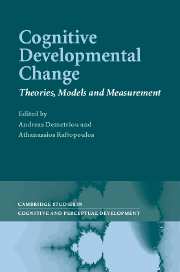Book contents
- Frontmatter
- Contents
- List of contributors
- Preface and acknowledgements
- Introduction: the what, how and why of developmental change: the emergence of a new paradigm
- 1 Mind, intelligence and development: a cognitive, differential and developmental theory of intelligence
- 2 Types of cognitive change: a dynamical, connectionist account
- 3 Developmental patterns in proportional reasoning
- 4 Building general knowledge and skill: cognition and microdevelopment in science learning
- 5 Cognitive change as strategy change
- 6 The emergence of mind in the emotional brain
- 7 Practices of quantification from a socio-cultural perspective
- 8 Contributions of central conceptual structure theory to education
- 9 Accelerating the development of general cognitive processing
- 10 Dealing with change: manifestations, measurements and methods
- 11 Dynamic modelling of cognitive development: time, situatedness and variability
- 12 Modelling individual differences in change through latent variable growth and mixture growth modelling: basic principles and empirical examples
- Index
- References
9 - Accelerating the development of general cognitive processing
Published online by Cambridge University Press: 22 September 2009
- Frontmatter
- Contents
- List of contributors
- Preface and acknowledgements
- Introduction: the what, how and why of developmental change: the emergence of a new paradigm
- 1 Mind, intelligence and development: a cognitive, differential and developmental theory of intelligence
- 2 Types of cognitive change: a dynamical, connectionist account
- 3 Developmental patterns in proportional reasoning
- 4 Building general knowledge and skill: cognition and microdevelopment in science learning
- 5 Cognitive change as strategy change
- 6 The emergence of mind in the emotional brain
- 7 Practices of quantification from a socio-cultural perspective
- 8 Contributions of central conceptual structure theory to education
- 9 Accelerating the development of general cognitive processing
- 10 Dealing with change: manifestations, measurements and methods
- 11 Dynamic modelling of cognitive development: time, situatedness and variability
- 12 Modelling individual differences in change through latent variable growth and mixture growth modelling: basic principles and empirical examples
- Index
- References
Summary
The problem space
I should preface this chapter by making the context of our work clear. Our main aim over twenty years of working on ‘cognitive acceleration’ has been an educational one, to improve the life chances of large numbers of students in the education system by increasing their ability to think effectively and so increase their general problem-solving ability and their academic achievement. To be sure, in order to achieve this aim we have had to consider in some detail theoretical models of cognition and of cognitive development, and it may be that the empirical results we have obtained will throw some light on these theoretical models, but the development of theory has not been our primary purpose. It follows that this chapter will be somewhat pragmatic and will take an eclectic view of models of cognition, drawing ideas from a number of sources as they appear to offer fruitful avenues towards our goal of devising educational methods for the acceleration of cognitive development.
Furthermore, I should clarify the particular aspects of ‘cognition’ and of ‘acceleration’ which will be addressed. Cognition will be used here quite specifically to refer to general processing capability, that is, a function of the mind which can be applied across all contexts. While it would be difficult to deny the predictive validity of multilevel models of the mind which include context-specific abilities and domain-specific talents as well as a general processing mechanism, it is the last of these which is the particular concern of our cognitive acceleration programmes.
- Type
- Chapter
- Information
- Cognitive Developmental ChangeTheories, Models and Measurement, pp. 296 - 317Publisher: Cambridge University PressPrint publication year: 2005

